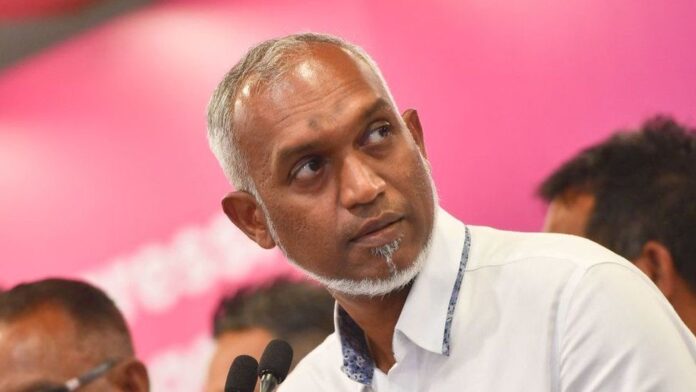The seeds of the crisis, which is mounting relentlessly, were sown way back in November 2024 when Muizzu got a controversial constitutional amendment passed by parliament.
By P.K.Balachandran
Colombo, March 26 – The Maldivian President Mohamed Muizzu has been clashing with all the arms of the State since November 2024. As of Thursday March 26, there is no sign of a let up in the crisis. Muizzu is now being assailed not only by the opposition but by the judiciary too.
In the April 21, 2024 parliamentary elections his Progressive Party of Maldivies-Peoples’ National Congress (PPM-PNC) alliance had secured 70 out of the 93 seats. Despite this monstrous majority, Muizzu has been at odds with parliament, and the judiciary too.
The seeds of the crisis, which is mounting relentlessly, were sown way back in November 2024. On November 20, last year, the Maldivian parliament passed a controversial constitutional amendment that added as a subsection to Article 73 of the Constitution. The amendment stipulated that MPs elected on a party ticket would lose their seats if they switched parties, resigned, or were expelled from their party. Independent MPs were also disqualified if they joined a party.
The bill was ratified with 78 votes in favour and 13 against, despite opposition from the Maldivian Democratic Party (MDP).
Petition in Supreme Court
Former MP Ali Hussain filed a petition in the Supreme Court to quash the amendment, arguing it violated citizens’ rights. He also requested an interim order to suspend MPs’ disqualification procedures until the court reached a final decision.
February 25, 2025, Parliament introduced a bill to amend the Judicature Act, proposing to reduce the Supreme Court bench from seven to five judges. This move was widely seen as an attempt to influence the court ahead of its ruling on Ali Hussain’s petition.
The next day, the amendment to reduce the Supreme Court bench was passed with a 68-9 vote after a contentious session where three MDP MPs were ejected for protesting.
Hours later, the Judicial Service Commission (JSC) suspended three Supreme Court justices—Dr. Azmiralda Zahir, Mahaz Ali Zahir, and Husnu Al Suood—citing an ongoing criminal investigation by the Anti-Corruption Commission (ACC).
The suspensions occurred just before a scheduled 11:00 AM hearing on Ali Hussain’s request for a stay order, which was subsequently cancelled.
The opposition condemned this as a power grab, alleging the government was neutralizing the judiciary to protect the anti-defection law.
On March 3, media reported growing concerns over the crisis, with the opposition warning of democratic backsliding amid simultaneous economic shortages. Former Minister Shauna Aminath described the moves as surpassing pre-2018 authoritarianism, indicating a collapse of constitutional checks and balances.
March 11, President Muizzu returned the Judicature Act amendment to Parliament for reconsideration after the Attorney General’s Office (AGO) found it lacked clear mechanisms for evaluating judicial competence, as required by the Constitution and existing law.
On March 17, Parliament referred the amendment to the Judiciary Committee for further review following Muizzu’s letter outlining the AGO’s concerns. On the same day, the suspension of the Supreme Court judges was submitted to the United Nations Human Rights Commissioner, the European Union, and the Commonwealth, indicating international scrutiny.
The Judiciary Committee is reviewing the Judicature Act amendment, while the Supreme Court, now diminished to four justices, is yet to rule on Ali Hussain’s petition.
The opposition continues to challenge the government’s actions, and the suspended justices’ fate hangs in the balance pending the JSC’s investigation and potential parliamentary vote on their removal.
The number of Supreme Court judges has fluctuated historically: it was set at seven in 2010 under President Mohamed Nasheed, reduced to five in 2014 under Abdulla Yameen, and restored to seven under Ibrahim Mohamed Solih.
The opposition, legal experts, and civil society have criticized the amendment and judicial suspensions as unconstitutional, arguing they undermine judicial independence and democratic principles. The timing of the suspensions—right before a critical hearing—has fuelled accusations of executive overreach.
END



 Logging you in...
Logging you in... Loading IntenseDebate Comments...
Loading IntenseDebate Comments...

